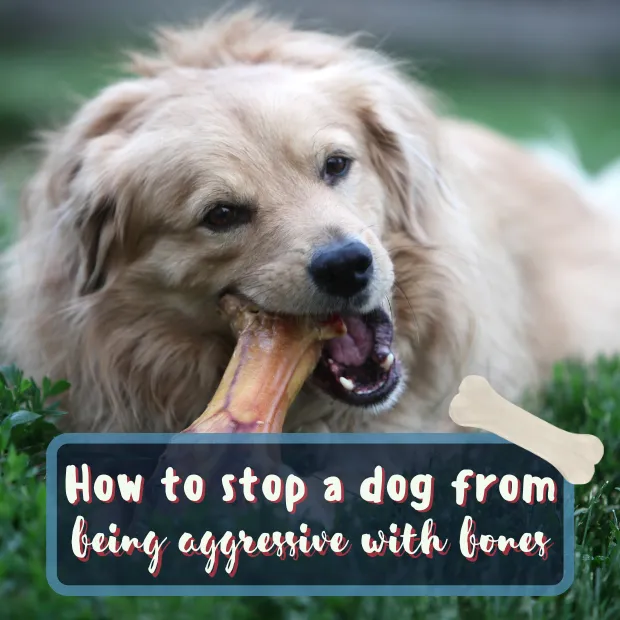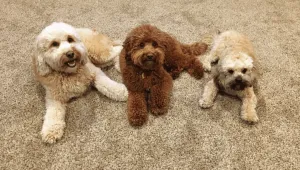Giving your dog a bone has many benefits. Bones provide dogs with essential nutrients, such as calcium and phosphorus. They also help to keep teeth clean and healthy. Chewing on bones can also help to relieve boredom and stress in dogs.
But when a dog is aggressive with bones, it can be a scary and dangerous situation for both the dog and the people around them. In this blog post, we will outline some tips on how to stop a dog from being aggressive with bones.
Make resource guarding a thing of the past with this SpiritDogTraining “Stop Resource Guarding” online course.
Just 10 minutes of daily training is enough to teach your dog trust around resources!
Table of Contents
ToggleContents of this article:
- How do you stop a dog from being aggressive with bones?
- Why does my dog growl when I give him a bone?
- What do I do if my dog is aggressive with bones?
- Do raw bones make dogs aggressive?
- My dog attacked me over a bone.
- What can I give my dog instead of bones?
- Is it normal for dogs to be aggressive over bones?
- Why do dogs get aggressive over bones?
- Should I take a bone away from my dog?
- How to take a bone away from a dog.
- How to stop a dog from being aggressive with bones.
How do you stop a dog from being aggressive with bones?
To stop a dog from being aggressive with bones, they need to feel confident it will not be taken away from them. Never take away a bone from them while they are chewing on it, and only give your dog bones when they are in their crate or in a designated area. Dogs should also only have one bone at a time to prevent resource guarding.
- Dogs should only have one bone at a time,
- Bones should only be given to them in their crate or in a designated area,
- Never take away a bone from them while they are chewing on it.
Why does my dog growl when I give him a bone?
Your dog is enjoying the bone, and they are worried it is going to be taken away from them if anyone gets too close. If your dog growls while chewing on a bone, this is communication and should not be punished, otherwise, your dog may escalate their behavior in order to get their point across.
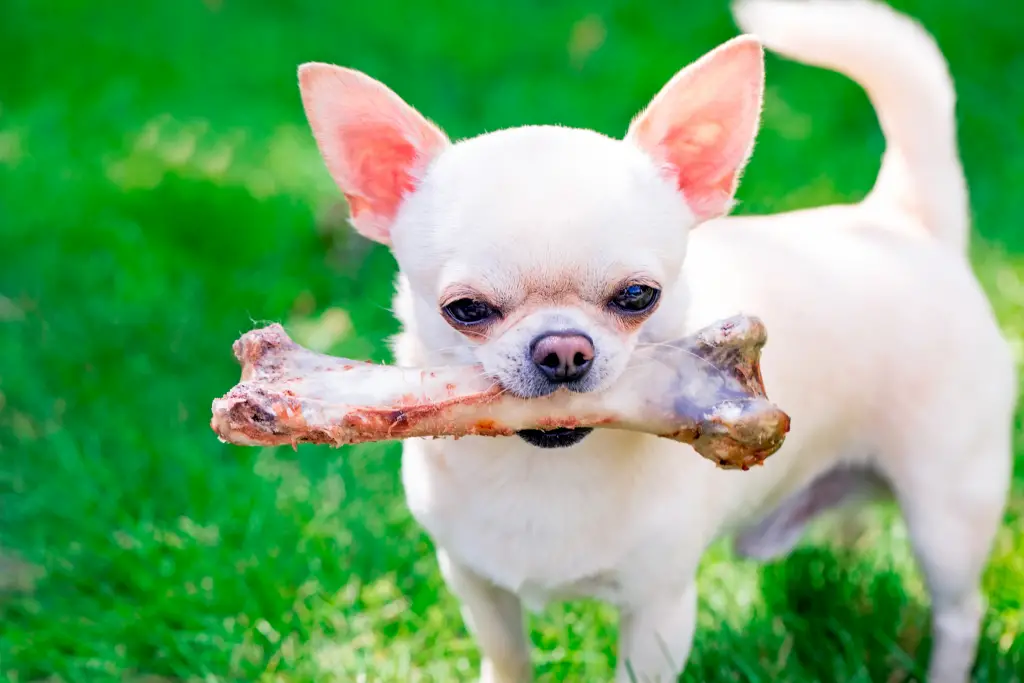
What do I do if my dog is aggressive with bones?
If your dog is being aggressive with bones, you should first consult with a behaviorist or trainer to see if there are any underlying issues that need to be addressed.
If your dog is resource guarding, you can work on desensitizing and counterconditioning your dog to people being around their bones. This can be done by teaching your dog that good things happen when someone passes by while they are chewing on a bone, such as extra tasty, high-value treats being dropped for them.
- Consult with a behaviorist or trainer
- Work on desensitizing and counterconditioning your dog to people being around their bones
- Give them extra tasty, high-value treats when someone passes by while they are chewing on a bone
Put an end to resource guarding with the SpiritDog Training “Stop Resource Guarding” online course. All you need is just 10 minutes of daily training and your pup will learn how to trust around resources in no time!
Do raw bones make dogs aggressive?
There is no scientific evidence to suggest that raw bones make dogs aggressive. The act of chewing on a bone keeps a dog’s mind occupied and can help to relieve boredom or stress so it can actually help many dogs be more calm and relaxed.
Bones are highly prized and valuable to a dog, so if they are worried it will be taken, they may behave in a way to stop that from happening, which could include growling. If you are worried about your dog’s behavior when they have a bone, there are many suitable alternatives that could be more appropriate.
My dog attacked me over a bone.
If your dog has attacked you over a bone, it is important to seek professional help to address the behavior. In cases where a dog has felt the need to attack someone to keep hold of their bone, other types of chews that do not last as long may be more appropriate.
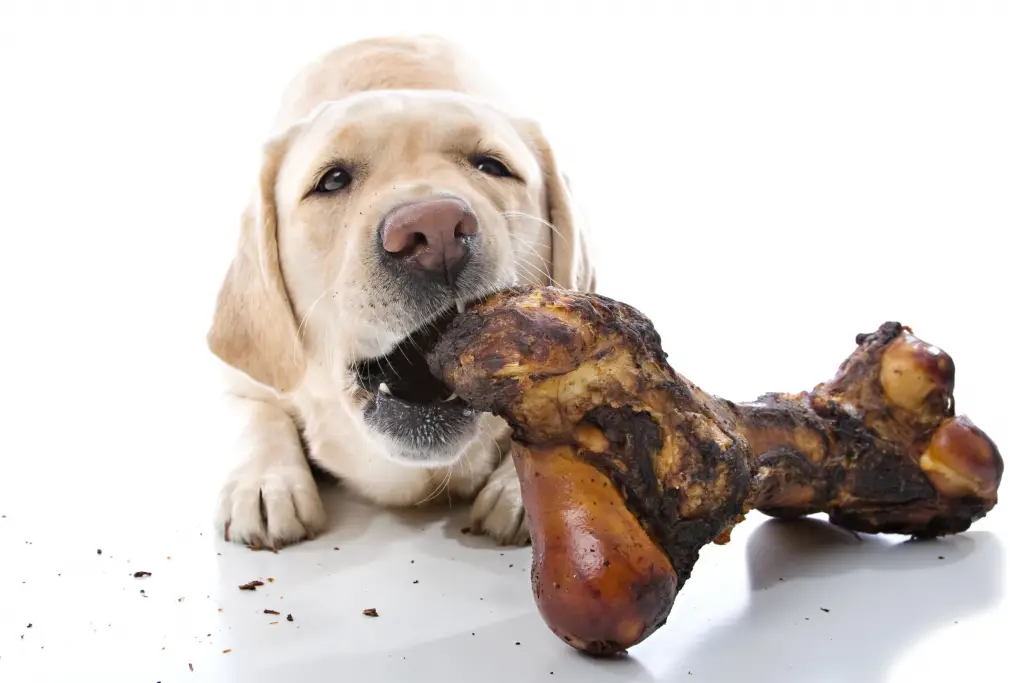
What can I give my dog instead of bones?
If you are worried about your dog being aggressive with bones, there are a variety of chews and toys that you can give them instead. These include:
- Stuffed Kongs,
- Pizzles, also known as bully sticks,
- Pig ears,
- Beef scalp,
- Tripe sticks,
- Chicken feet.
These are all-natural chews that do not last as long as a bone, so should not be as much of a problem. It is still important to allow your dog to enjoy their chew in peace and not attempt to take it away from them while they are chewing.
Is it normal for dogs to be aggressive over bones?
It is not abnormal for dogs to be slightly possessive or aggressive over their bones. However, if the aggression is severe or uncontrolled, it could be a sign of an underlying issue that needs to be addressed. If you are concerned about your dog’s behavior, consult with a behaviorist or trainer.
This behavior is called resource guarding, and it is simply a way for dogs to communicate that they are not done with the bone yet. If you try to take away a bone from a dog while they are still interested in it, they may growl to tell you they don’t want to give it up.
If the behavior escalates beyond growling, engage a qualified, experienced professional to help you with the problem, because this can get out of hand and become dangerous if it is dealt with in the wrong way.
Why do dogs get aggressive over bones?
Dogs get aggressive over bones because they are of high value to the dog, and the dog does not want to lose them. Imagine you are at a restaurant and you are enjoying your meal. One of the waiting staff comes over and takes your plate away when you are not even halfway through your meal.
You would probably be quite upset, and try to stop them from taking your food – the same is true for dogs. They become aggressive because they think you are going to take their bone away before they are finished with it and they are asking you not to.
Should I take a bone away from my dog?
No, you should not take a bone away from your dog while he is still interested in it. This is likely to escalate the behavior and make your dog more aggressive. If you need to take the bone away, wait until your dog is finished with it and then remove it.
How to take a bone away from a dog.
Decide if it’s truly necessary to remove the bone at all. If it’s a matter of life and death and you absolutely must take a bone away from your dog, trade the bone for something your dog considers more valuable.
This could be a handful of pieces of cooked chicken thrown down nearby to tempt him away from the bone and distract him long enough for you to remove it.
Try to ensure he doesn’t see you taking the bone away, otherwise the cooked chicken trick might not work next time. You may need to lure your dog out of the room with something tastier in order to remove the bone safely.
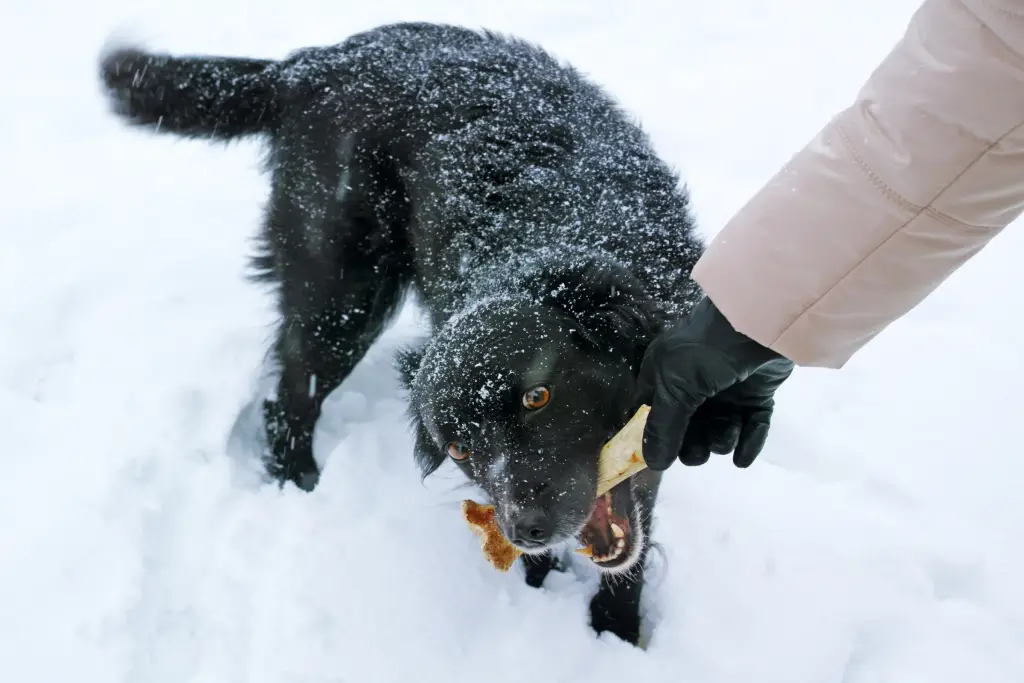
How to stop a dog from being aggressive with bones.
It is normal for dogs to be aggressive over bones, as they are of high value to the dog. If you need to take a bone away from your dog, wait until they are finished with it and then remove it. You may need to lure your dog out of the room with something tastier in order to remove the bone safely.
Never punish a growl, as this can make the problem worse. If the behavior escalates beyond growling, engage a qualified, experienced professional to help you with the problem.
End resource guarding with this SpiritDog Training “Stop Resource Guarding” online course. Incorporate just 10 minutes of daily training to instill trust in your pup around resources!
References: https://www.researchgate.net/figure/Aggression-scores-in-the-Take-away-bone-test-in-Study-I-median-quartiles-whiskers_fig1_259989266

